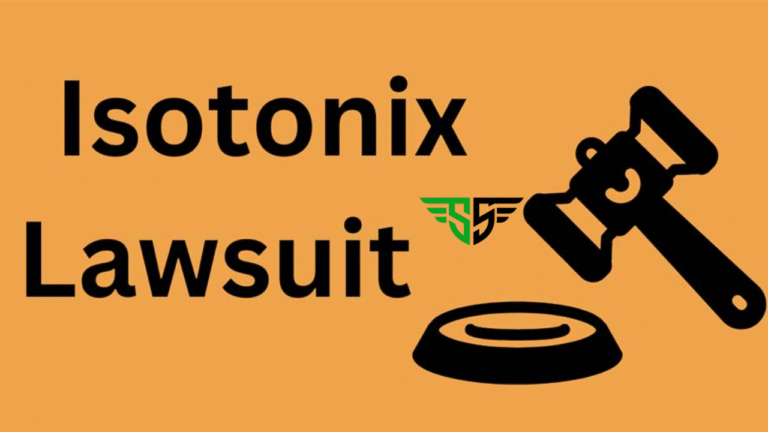If you’ve heard about the Isotonix lawsuit and are feeling confused, you’re not alone. Many people are searching for clear and simple answers about this legal case. This article will help you understand everything in plain English — what it is, who’s involved, what customers are saying, and what might happen next.
What Is the Isotonix Lawsuit All About?
The Isotonix lawsuit refers to legal action taken against the makers of Isotonix, a line of nutritional supplements sold by Market America. Customers and critics have raised concerns that the company may have made false claims about the benefits of its products. The main focus of the lawsuit is whether Isotonix misled consumers through marketing tactics and whether the products actually deliver the health results they promise.
In the United States, the supplement industry is regulated differently than pharmaceuticals. That means many products don’t need to go through strict testing before hitting the market. But if a company makes unproven medical claims or uses deceptive practices, it can face legal trouble — and that’s what’s happening here.
Why Are People Suing Isotonix?
People are suing Isotonix because they believe they were misled into buying products that didn’t work as promised. Some of the complaints include:
- Claims that the supplements could improve health in ways not backed by science
- Overpricing for ordinary vitamins
- Aggressive marketing through a multi-level marketing (MLM) model
- Pressure to become a distributor instead of just a customer
Some customers say they bought the products believing they would help with energy, immune health, or even serious conditions. But when they didn’t see results — or experienced side effects — they began to question the safety and honesty behind the products.
The lawsuits argue that Isotonix exaggerated the science and may have even falsely represented what the supplements could do. This could be considered fraud under consumer protection laws.
Who Is Involved in the Isotonix Lawsuit?
The main players in the Isotonix lawsuit include:

- Customers and former distributors who say they were harmed or misled
- Market America, the company behind Isotonix
- Legal firms that are gathering evidence and bringing forward class actions
- Possibly, regulatory bodies like the Federal Trade Commission (FTC) or Food and Drug Administration (FDA) if rules were broken
Let’s break this down a bit more:
What Is Market America?
Market America is the parent company of Isotonix. It’s known for its multi-level marketing model, where people earn money by selling products and recruiting others to sell them too. Market America has been around since 1992 and claims to help people become entrepreneurs. However, critics argue that the business is shaped more like a pyramid scheme, where the majority of participants lose money.
The company has faced past legal issues, including a lawsuit in California that called its MLM model illegal and accused it of targeting low-income Chinese immigrants.
Are Doctors Involved?
Yes, some medical professionals have raised concerns about Isotonix products. While the company uses terms like “scientifically advanced formulas,” several experts say the health claims lack strong scientific evidence. Some doctors warn that taking high doses of vitamins — especially without a medical reason — can be unnecessary or even harmful.
Doctors haven’t filed the lawsuit directly, but their opinions may be used as evidence to question the company’s marketing tactics.
Is It a Class Action?
Yes, many cases against Isotonix are moving forward as class action lawsuits. This means a group of people who have the same complaint can file one large case together. It makes legal action easier and more powerful, especially for consumers who might not afford to sue on their own.
If the court approves the class action, thousands of people could get money back if the case is successful.
What Do Customers Say About Isotonix?
Customer opinions about Isotonix are mixed. Some loyal users swear by the supplements and say they feel better when they take them regularly. But others are frustrated and feel they were scammed. Here’s what many unhappy customers say:
- “It’s just overpriced vitamin C.”
- “I got talked into buying hundreds of dollars’ worth of stuff I didn’t need.”
- “I was promised better health, but nothing changed.”
- “It’s all about recruiting others, not the products.”
On Trustpilot and other review sites, Isotonix and Market America get both praise and complaints. Positive reviews often come from current distributors, which raises questions about bias. Meanwhile, negative reviews often come from people who tried the products and felt misled or pressured.
Are Isotonix Products Safe to Use?
This is a very important question. Most Isotonix products are made from vitamins, minerals, and herbal extracts, and many of the ingredients are generally considered safe. However, problems arise when:
- People take more than the recommended amount
- People take them instead of seeing a doctor for real health conditions
- Allergies or sensitivities cause reactions
The FDA does not approve dietary supplements before they go on the market, which means companies can sell these products without proving they’re effective or even completely safe. That doesn’t mean every supplement is dangerous — but it does mean you should be cautious and always talk to a doctor before starting anything new.
Some critics say the “isotonic delivery system” used by Isotonix is just a fancy phrase with no proven advantage. Others warn that excessive vitamins can harm the liver or kidneys over time.
What Happens If the Company Loses?
If Market America or Isotonix loses in court, several things could happen.

Will People Get Money Back?
Yes, if the lawsuit is successful, customers who bought Isotonix products may be eligible for refunds or compensation. This could include:
- Reimbursement for the cost of the products
- Payments for medical bills if someone was harmed
- Punitive damages if the court finds serious wrongdoing
Usually, class action settlements create a fund where eligible people can file claims. You’ll need receipts or proof of purchase, though some cases allow claims without them.
Will Isotonix Still Be Sold?
It depends on the court’s decision. If the lawsuit finds that the products were unsafe or falsely advertised, the company could be forced to:
- Change its marketing messages
- Stop selling specific formulas
- Offer clearer safety warnings
However, it’s unlikely that all Isotonix products would disappear completely unless they’re proven dangerous.
Could Other Companies Be Sued Too?
Yes. If the Isotonix lawsuit is successful, it might open the door for lawsuits against other supplement companies making similar claims. The health supplement industry is full of bold promises, and a lot of them don’t have real science behind them.
This case could be a wake-up call for the entire industry — especially companies using MLM structures and aggressive sales tactics.
How Can You Join the Lawsuit?
If you bought Isotonix products and feel you were misled, you may be able to join the class action lawsuit. Here’s what to do:
- Look up law firms currently handling the case (many post details online).
- Check if you qualify — usually, you must have bought the products during a certain time period.
- Fill out a claim form or contact the legal team to be added as a class member.
- Keep any emails, receipts, or product packages as proof.
You don’t usually need to pay anything upfront to join a class action. Lawyers are typically paid out of any settlement or court award.
The Bottom Line
The Isotonix lawsuit is a big deal — not just for Market America, but for customers and the whole supplement industry. While the products might not be outright dangerous, there are serious questions about whether they live up to the hype.
Many people feel they were misled by the marketing, the MLM structure, and the promises made. And now, courts are deciding if those feelings were justified under the law.
If you’ve bought Isotonix and felt disappointed, this lawsuit may help you get answers — or even money back. If nothing else, it’s a reminder to be careful with health products that sound too good to be true.


